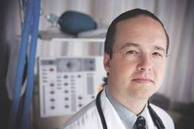Because this is my first commentary in CHEST Physician, I would like to take this opportunity to thank Dr. Peter Spiro for his astute author selection and insightful editorial comments during his 3-year term as editor of this section. I sincerely hope that my selections in the coming years measure up to the high standards he has firmly established. Readers with comments and/or suggestions should feel free to contact me at any time via e-mail (lmorrow@creighton.edu) as I sincerely welcome your criticisms and collaborations. I look forward to serving both our readers and CHEST in the years to come.
Ebola: Lessons learned in the Nebraska medicine biocontainment unit
View on the News
| Dr. Lee Morrow |
Dr. Lee Morrow, FCCP, Section Editor, comments: In this first installment of my tenure as the section editor of Critical Care Commentary, I am extremely grateful to Dr. Craig Piquette and colleagues for providing their first-hand insights on treating critically ill patients with the Ebola virus within one of the United States' most advanced biocontainment units.
While optimal Ebola therapies are yet to be fully elucidated, these early experiences highlight several issues this infection - and other, future epidemic illnesses - may superimpose upon routine ICU cares. The incremental precautions required when performing invasive procedures in highly contagious individuals such as these, while extensive, are not necessarily surprising. However, these early experiences with the Ebola virus have required unique reflections on our self-imposed limits to providing care.
What is the point at which the potential benefit to the patient with the Ebola virus becomes outweighed by the risk of harm to the physicians providing their care? It has convincingly been argued that our sacred oath of "Primum non nocere" requires us to be stewards in preventing harm to ourselves as well as to our patients. Withholding cardiopulmonary resuscitation and restricting the roles of trainees in the care of these patients are provocative examples of our competing interests and certainly merit further considerations.
Because this is my first commentary in CHEST Physician, I would like to take this opportunity to thank Dr. Peter Spiro for his astute author selection and insightful editorial comments during his 3-year term as editor of this section. I sincerely hope that my selections in the coming years measure up to the high standards he has firmly established. Readers with comments and/or suggestions should feel free to contact me at any time via e-mail (lmorrow@creighton.edu) as I sincerely welcome your criticisms and collaborations. I look forward to serving both our readers and CHEST in the years to come.

